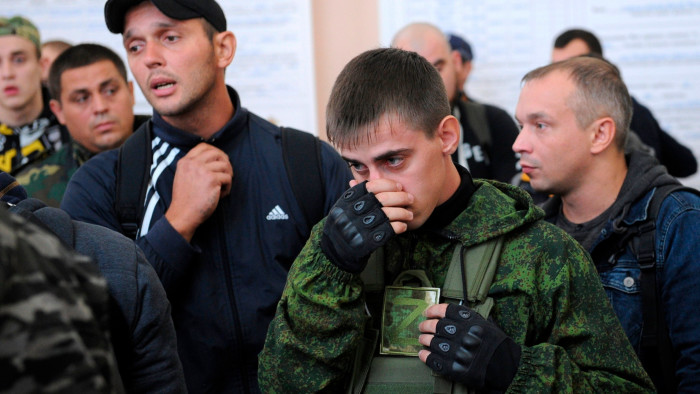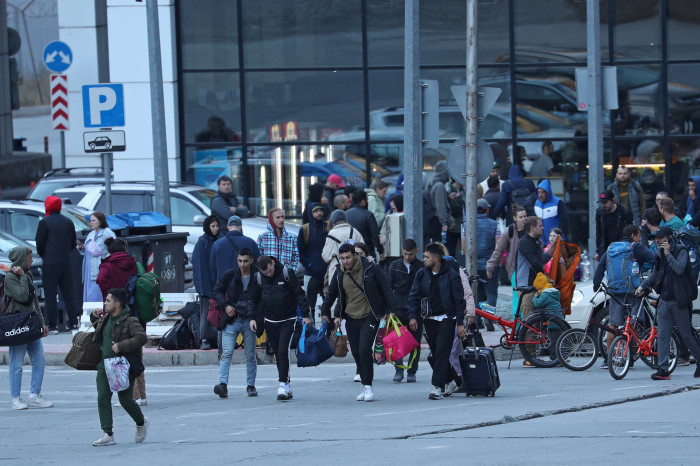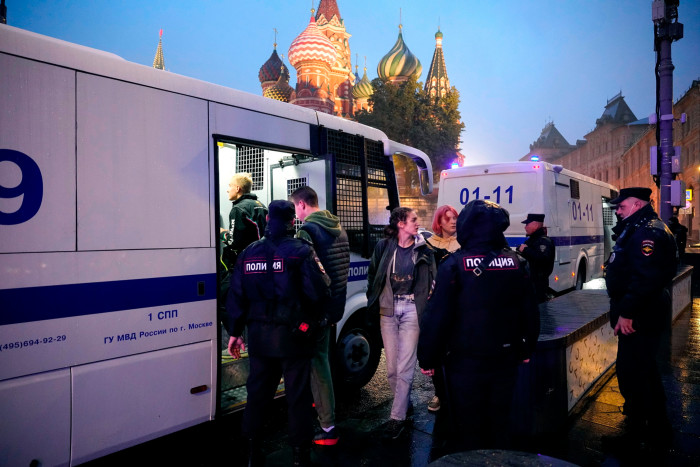Russians run and hide from Putin’s zealous draft officials

Simply sign up to the War in Ukraine myFT Digest -- delivered directly to your inbox.
Late on Sunday night, Ilya, a 38-year-old Muscovite, hobbled to his front door on crutches to find two officials handing him a draft notice.
Ilya pointed to the cast on the leg he broke falling down the stairs a few weeks earlier, refused to sign the papers, cursed at the officials and slammed the door.
“I told them, ‘why don’t you go where the Russian warship went,” Ilya said, referring to a cruiser that a Ukrainian serviceman told to “fuck off” at the start of Russia’s invasion and that Ukraine later sank.
“What have Ukrainians done to me? I have a tonne of friends there. What am I going to do, go and shoot at their relatives? Are they serious?”
Almost a week after President Vladimir Putin announced the “partial” mobilisation of army reservists to bolster his forces in Ukraine, tens of thousands of Russians are refusing to enlist, in the biggest backlash against the Kremlin since the invasion began in February.
Only fit adult men with combat experience are eligible with some exceptions, but the Kremlin admitted on Monday that the draft had affected a much greater swath of the population than Putin had promised — shattering a carefully maintained facade that had allowed life for most Russians to carry on as normal.

The move has prompted some to refuse, others to protest and still more to flee the country, with flights sold out for days and long queues forming at Russia’s land border crossings.
No longer able to rely on Russians’ tacit support or apathy, the Kremlin is faced with a dilemma. A further crackdown on society — where dissent about the war has been essentially outlawed since March — would risk undermining support for it further.
But backtracking after Putin moved to annex four regions in south-eastern Ukraine and threatened the west with nuclear weapons could open space for more instability.
“They only know how to implement their ideas with violence. And violence, war and mobilisation weren’t part of the social contract,” said Andrei Kolesnikov, a fellow at the Carnegie Endowment for International Peace. “They are undermining their social support base of people who were indifferent and allowed to go on living their lives. This is a huge mistake.”
The most striking protests against Putin’s decree have been in Dagestan, an impoverished region in the north Caucasus Mountains that has sent a disproportionate number of men to fight in Ukraine.
On Sunday and Monday, people in several cities in Dagestan chanted “No to war!”, blocked off an important road, and argued with officials. Footage posted on social media showed women scuffling with police officers, several violent detentions and apparent attacks on protesters by groups of thugs.
One doctor in the city of Makhachkala said some patients had asked her to provide them with medical exemptions so they could avoid the draft. “On the day they announced mobilisation, everyone started whispering in queues, shops and on the bus,” she said. “There was already news — everyone had heard that someone they knew got drafted. Of course, people are upset.”
The doctor, who spoke on condition of anonymity, said authorities had begun drafting medical workers, including nurses, in Dagestan, prompting some of her friends and relatives to flee to Kazakhstan. “We’re going to hide and run away. We won’t open the door, go to the draft office or take the notices. We’ve talked it all over,” she said.
There is also evidence officials are using draft notices as reprisals against people arrested for protesting against the war.

Andrei, an 18-year-old student whose last name the Financial Times chose not to publish, was detained during a demonstration last week in central Moscow and taken to a police station. After spending several hours there, at around 1am he and other young men were told to head upstairs, where an official wrote out conscription notices.
They tried to refuse signing but a police officer threatened them with being kept overnight and other repercussions. After seeing one young man sign and leave the station immediately, the others, including Andrei, followed suit. The FT has seen the copy of his conscription notice.
Under Russian law, draftees must be handed their notices in person. The penalty for failing to obey a summons is a fine.
The young men signed their draft notices but did not go to the office the next day, Andrei said, adding that they knew their rights and that they would not be held criminally liable.
Moreover, as a student, he is supposed to have his military service obligation deferred.
“I don’t fit the bill for mobilisation, by any criteria,” Andrei said. “My main theories are that it’s being done to frighten people, or to catch the foolish ones.”
Many people have attempted to avoid the draft by fleeing the country amid widespread rumours Russia will restrict military-age men from leaving.
The Kremlin and the defence ministry said on Monday that there were no plans to close the borders, a sign that they were seeking to tame widespread public panic, and have blamed the anger on overzealous local authorities.
On Sunday, Vladimir Soloviev, a bellicose state television talking head, jokingly called on unscrupulous draft officials to be executed. Shortly after, one was shot in Ust-Ilimsk in eastern Siberia by a man who was reportedly angry that a friend who did not meet the criteria had been enlisted.
Some officials have called on Russia not to stop those who want to leave the country.
“Let the rats who are running run. The ship will be ours, it’s gaining strength and clearly moving towards its target,” Ella Pamfilova, Russia’s election commissioner, said on Monday.
On Monday, officials at border stations in some airports and at the land border with Kazakhstan said they had been given lists of people who were forbidden to leave the country.
Alexander, a 33-year-old who works for a European company in Moscow, said that on Monday he was stopped from boarding a flight to Turkey with his girlfriend at the capital’s Vnukovo airport. The FT has seen a copy of Alexander’s exit ban.
“They were very polite. They told me the draft office is banning me from leaving Russia because of mobilisation,” even though he had never served in the military, Alexander said.
“There were all these other guys waiting on the bench who had the same problem. They were flying to the Seychelles, the Maldives, they had their wives and kids with them, were going on honeymoon. And that’s it — the men can’t leave.”
Other Russians have resisted the draft by hiding from officials who were attempting to deliver the summonses.
Lev, a 27-year-old who lives in suburban Moscow, quit his job and left home after officials put his draft notice in his mailbox. He said he had decided to avoid his registration address but stay in the country, fearful that he would be caught at the border and handed a draft notice.
“Putin’s ‘special military operation’ has just destroyed my life and any chances I had,” he said. “And now he literally wants to take my life away.”
Additional reporting by Polina Ivanova in Berlin
Comments